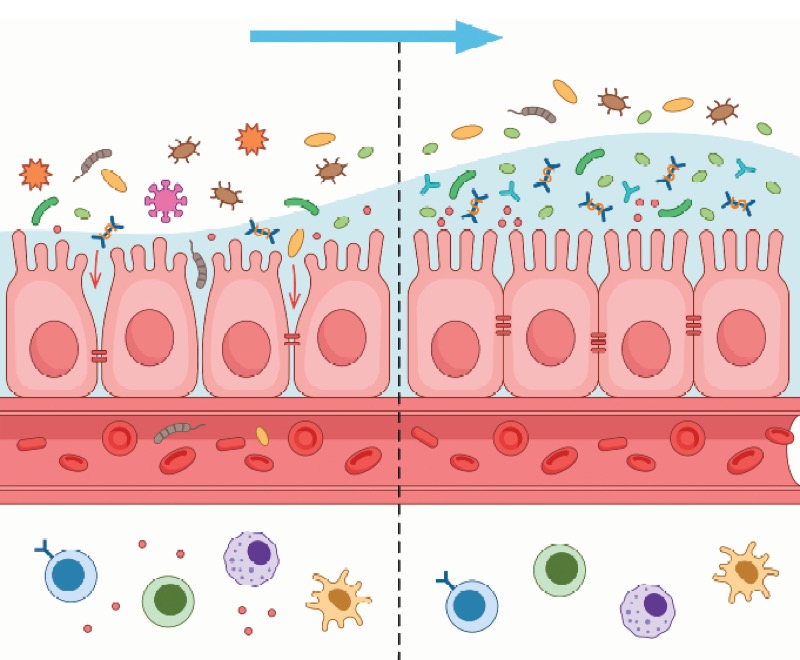
Fecal microbiota transplantation (FMT) may enhance the effectiveness of immunotherapies by reducing gut dysbiosis, according to a presentation at the 2025 ASCO Annual Meeting.
However, antibiotics should be used sparingly in people receiving immunotherapies, in short stints after an infection, because the overuse of antibiotics may increase dysbiosis and could potentially inhibit the effectiveness of FMT, according to Arielle Elkrief, MD, FRCPC, the co-director of the CHUM Microbiome Centre, in Montreal. “Dysbiosis is a key biomarker of response and resistance to immunotherapy; the goal of FMT is to replace the diseased dysbiotic microbiome of a patient with that of a donor microbiome,” Dr. Elkrief said.
She added that the FMT procedure does not generally require antibiotics, but short courses of antibiotics may be needed if FMT causes an infection.
“Fecal microbiota transplantation is safe and potentially increases immunotherapy activity across multiple histologies,” Dr. Elkrief said. In two phase 1 studies, an FMT donation from people who had benefited from immunotherapy helped melanoma patients who were refractory to immunotherapy, with post-FMT objective response rates (ORRs) of 20% to 30% (Science 2021;371[6529]:595-602 and 602-609).
These results prompted the phase 2 FMT-LUMINate trial, for which Dr. Elkrief is an investigator. This effort showed ORRs for FMT of, respectively, 80% in people with non-small cell lung cancer and 75% in those with melanoma (Cancer Res 2024;84 [7 suppl]:CT258).
FMT is not readily available, Dr. Elkrief noted, due to challenges with getting enough donors of fecal material. In her lab and others, researchers are developing live biotherapeutic products that mimic the action of FMT.
Given FMT’s limited availability, some patients taking immunotherapies won’t be able to benefit from it. However, many people taking immunotherapies will have access to antibiotics, which can be vital after infections—but it’s important not to overuse antibiotics in this situation, Dr. Elkrief stressed.
“Antibiotic stewardship is key to decreasing antibiotic-related dysbiosis and improving outcomes to immunotherapy for patients with cancer,” Dr. Elkrief said. When infections occur, she said, “we recommend a short course, a narrow spectrum and to reassess the need for antibiotics constantly” in consultation with experts in infectious disease.
Dr. Elkrief reported financial relationships with AstraZeneca, Bristol Myers Squibb and Merck.
Enhertu + Perjeta Potential First-Line Combo For HER2-Positive Metastatic Breast Cancer
Trastuzumab deruxtecan (T-DXd; Enhurtu, AstraZeneca) combined with pertuzumab (Perjeta, Genentech) may become first-line therapy for people with metastatic HER2-positive breast cancer, suggests an interim analysis of the phase 3 DESTiNY-Breast09 trial.
DESTINY-Breast09 principal investigator Sara Tolaney, MD, MPH, FASCO, presented the analysis at the 2025 ASCO Annual Meeting. TDX-d plus pertuzumab outperformed the current first-line treatment for metastatic HER2-positive breast cancer—a taxane plus trastuzumab plus pertuzumab (THP).
“T-DXd, in combination with pertuzumab, demonstrated a statistically significant and clinically meaningful improvement in progression-free survival [PFS],” said Dr. Tolaney, who is the chief of the Division of Breast Oncology at the Dana-Farber Cancer Institute, in Boston.
The median PFS for TDX-d plus pertuzumab was 40.7 months as of the interim analysis, compared with 26.9 months for THP (hazard ratio [HR], 0.56; P<0.0001). There were 383 and 387 participants, respectively, in the TDX-d and THP arms, and the median follow-up period was 29.2 months.
“The curves start to separate early, with differences already seen by the six-month landmark time point,” Dr. Tolaney said. By this time point, 12 people in the THP arm had disease progression, compared with six people receiving TDX-d and pertuzumab. There were also more complete responses with TDX-d plus pertuzumab (15.1%) than with THP (8.5%).
“These data suggest that TDX-d and pertuzumab may represent a new first-line standard of care for patients with metastatic HER2-positive breast cancer,” Dr. Tolaney added.
The longer PFS for TDX-d and pertuzumab held whether patients had received prior treatment or not, if their cancer was hormone receptor–positive or negative, and regardless of their PIKC3A mutation status.
TDX-d is considered a second-line treatment for metastatic breast cancer, Dr. Tolaney noted, due to results from 2022’s DESTINY-Breast03 trial (N Engl J Med 2022;386[12]:1143-1154). “There’s been much interest in trying to move TDX-d into the first-line setting” for people with metastatic HER2-positive breast cancer.
She noted that the PFS for current first-line THP therapy is 18.5 months (N Engl J Med 2012;366[2]:109-119), and that one-third of people who start the first line are unable to receive second-line treatments because their disease progresses so quickly.
Dr. Tolaney noted that there is mechanistic evidence that combining TDX-d and pertuzumab inhibits tumor signaling more than either drug can do alone (Cancers [Basel] 2018;10[10]:342).
The overall survival data in DESTINY-09 are not mature. However, the trend line suggests better overall survival for TDX-d plus pertuzumab, Dr. Tolaney said. In addition, the safety profile was similar in the two study arms, with similar proportions of serious adverse reactions for TDX-d plus pertuzumab (27%) and THP (25.1%).
Although the safety profile of TDX-d plus pertuzumab was comparable to that of THP, there was one cautionary note. There were few deaths in either treatment arm (TDX-d plus pertuzumab, 13; THP, 3), but there were more potentially treatment-associated deaths (5 vs. 1) for TDX-d and pertuzumab.
Dr. Tolaney reported a financial relationship with AstraZeneca.
New Durvalumab Regimen Scores In Localized Gastric Cancer Trial
Adding the immunotherapy durvalumab (Imfinzi, AstraZeneca) to a standard chemotherapy regimen improves outcomes for people with resectable gastric or gastroesophageal junction cancer, per results of the phase 3 MATTERHORN trial presented at the 2025 ASCO Annual Meeting.
“I’m pleased to report that MATTERHORN met its primary end point of event-free survival [EFS],” said principal investigator Yelena Janjigian, MD, the chief of gastrointestinal medical oncology at Memorial Sloan Kettering Cancer Center, in New York City. Study results were simultaneously published in The New England Journal of Medicine (2025 Jun 1. doi:10.1056/NEJMoa2503701).
The current standard of care for gastric or esophageal cancer is a chemotherapy regimen known as FLOT (5-fluorouracil, leucovorin, oxaliplatin and docetaxel). In the investigational arm of the trial (n=474 adults), adding durvalumab to FLOT led to a median EFS of 40.7 months; the EFS for FLOT plus placebo (n=474 adults) was 32.8 months (hazard ratio, 0.71; 95% CI, 0.58-0.86, P<0.001).
“This translates to a 29% relative risk reduction in disease recurrence, progression or death,” Dr. Janjigian said. “There was an early and sustained separation in the event-free survival curves.” For example, at 24 months 67% of people in the durvalumab arm had not experienced any new cancerous events, compared with 59% in the FLOT plus placebo arm. The final overall survival analysis is pending, Dr. Janjigian said.
MATTERHORN included participants in Asia, Europe, and North and South America, all of whom had resectable stage II to IVa gastric or gastroesophageal junction cancer, with no metastases or prior therapy. “This is one of the most globally representative trials in gastric and gastrooesophageal cancer,” Dr. Janjigian said.
Patients in the durvalumab arm received two cycles of neoadjuvant durvalumab plus FLOT before surgery to resect cancerous tissue, and up to 12 more cycles of durvalumab after surgery during the following year’s adjuvant phase. Tumors were completely removed in 92% of patients in both arms, and adverse events were balanced between arms. This included the most serious adverse event, neutropenia.
“The addition of durvalumab did not negatively impact FLOT delivery or completion of surgery,” Dr. Janjigian said. “MATTERHORN supports global adoption of perioperative durvalumab plus FLOT as a new standard for patients with localized gastric and gastroesophageal adenocarcinoma.”
Dr. Janjigian reported research funding from AstraZeneca.
{RELATED-HORIZONTAL}


